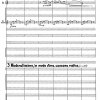Mazovia
Mazowsze [Mazovia], chamber cantata for solo soprano and tenor, small choir of sopranos and tenors and small orchestra (1951)
{slider=Mazowsze [Mazovia], chamber cantata. Largo, molto cantabile /fragment/}
Andrzej Bachleda - tenor, Zofia Stachurska - soprano, Lidia Skowron - soprano, Chorus and Orchestra of the Kraków Philharmonic, cond. Jerzy Katlewicz, Kraków 1953
{/slider}
{slider=Mazowsze [Mazovia], chamber cantata. Moderatissimo, in modo d'una canzona rustica /fragment/}
Andrzej Bachleda - tenor, Zofia Stachurska - soprano, Lidia Skowron - soprano, Chorus and Orchestra of the Kraków Philharmonic, cond. Jerzy Katlewicz, Kraków 1953
{/slider}
{slider=Mazowsze [Mazovia], chamber cantata. Lento assai, rubato e delicatamente /fragment/}
Andrzej Bachleda - tenor, Zofia Stachurska - soprano, Lidia Skowron - soprano, Chorus and Orchestra of the Kraków Philharmonic, cond. Jerzy Katlewicz, Kraków 1953
{/slider}
{slider=Mazowsze [Mazovia], chamber cantata. Molto trannquillo /fragment/}
Andrzej Bachleda - tenor, Zofia Stachurska - soprano, Lidia Skowron - soprano, Chorus and Orchestra of the Kraków Philharmonic, cond. Jerzy Katlewicz, Kraków 1953
{/slider}
{slider=Mazowsze [Mazovia], chamber cantata. Larghetto, dolce e semplice /fragment/}
Andrzej Bachleda - tenor, Zofia Stachurska - soprano, Lidia Skowron - soprano, Chorus and Orchestra of the Kraków Philharmonic, cond. Jerzy Katlewicz, Kraków 1953
{/slider}
The work was premiered on 18 September 1952 at the Kraków Philharmonic Hall. The orchestra was conducted by Jerzy Katlewicz, with Zofia Skowron and Andrzej Bachleda singing the solo parts. Serocki composed the work as if in lieu of a planned Peace Cantata to words by Tadeusz Borowski. Mazovia was composed to fragments of a ten-part poem by Władysław Broniewski with the same title. The poem, praising the Mazovian landscape, contains profound symbolic messages, reminiscences, reflections on the meaning of life, tradition, beauty and creation. The composer presented them in five short parts, using slow tempos and a quiet mood. The musical setting is decidedly small-scale, for the choir has just 6–8 soprano and tenor voices, while the orchestra includes the flute, the oboe, two clarinets and bass clarinet as well as seven string instruments (violin, three violas and three cellos).
Part one, Largo, molto cantabile, is a kind of invocation for male and female voices in the choir, interspersed with solo episodes of the clarinet and the flute. Part two is entitled Moderatissimo, in modo d'una canzona rustica. This “folk song” is written for clarinets and strings, and is based on an ostinato rhythm in the bass. Fragments of the second and tenth part of Broniewski’s poem are presented here by the tenor and the choir mezza voce; they praise the beauty of “the Mazovian plain”, “Tumska Góra”, “Royal Forest”, “marshes” and “marigolds”, and reflect on the fact that everything inevitably passes. Part three (Lento assai, rubato e delicatamente) is written for both solo voices and the choir, and is characterised by fairly frequent changes of the metre. The text is compiled from those verses of Broniewski’s poem that refer to the beauty of the Vistula river, Vistula landscapes and nature’s fruits (plums from Polska Kępa, the forest in Cieśle and “raspberries found in it”).
Part four is unique in the context of the whole piece as it is written only for vocal voices. These voices, singing in various configurations (solo choir, tenor or soprano with the choir, solo tenor or soprano) and molto tranquillo (quasi marciale), chant sotto voce selected verses from the seventh part of Broniewski’s poem dedicated to the “Polish language”. And then the finale – Larghetto, dolce e semplice – returns to the
Sheet music available from: PWM





